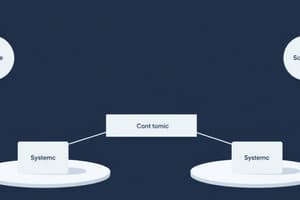Podcast
Questions and Answers
What is the primary characteristic of deterministic systems?
What is the primary characteristic of deterministic systems?
- Relying heavily on interaction from people
- Following a standard with a rule book (correct)
- Continually changing and adapting to the environment
- Assigning a probability to future events
Which type of system is most likely to have a predictable output?
Which type of system is most likely to have a predictable output?
- Deterministic systems (correct)
- Adaptive systems
- Probabilistic systems
- Self-organising or cybernetic systems
What is the primary goal of a business when creating sales forecasts?
What is the primary goal of a business when creating sales forecasts?
- To follow a standard with a rule book
- To try to change before the event has occurred (correct)
- To continually change and adapt to the environment
- To assign a probability to future events
Which type of system is least likely to be computerised?
Which type of system is least likely to be computerised?
What is the primary characteristic of self-organising or cybernetic systems?
What is the primary characteristic of self-organising or cybernetic systems?
What is the primary difference between deterministic and probabilistic systems?
What is the primary difference between deterministic and probabilistic systems?
Flashcards are hidden until you start studying
Study Notes
Deterministic Systems
- Deterministic systems always produce the same output from a given set of initial conditions and inputs, ensuring predictability and consistency in behavior.
- Outputs can be calculated and anticipated with precision, making these systems reliable in modeling and simulations.
Predictable Output Systems
- Deterministic systems are most likely to have predictable outputs, as their defined rules lead to specific outcomes without randomness.
Business Sales Forecasts
- The primary goal of businesses creating sales forecasts is to predict future sales, which aids in budgeting, inventory management, staffing, and strategic planning.
- Accurate forecasts help optimize resources and enhance decision-making processes to achieve business objectives.
Computerization of Systems
- Non-complex, less structured systems, such as intuitive decision-making processes or artistic endeavors, are least likely to be computerized due to the difficulty in codifying human nuances and creativity.
Self-Organizing Systems
- Self-organizing or cybernetic systems exhibit the ability to adapt and evolve without external control, responding intelligently to changes in their environment.
- These systems rely on feedback mechanisms to self-regulate and maintain stability.
Deterministic vs. Probabilistic Systems
- The primary difference lies in predictability: deterministic systems yield consistent outcomes, while probabilistic systems incorporate randomness and uncertainty, leading to multiple potential outcomes.
Studying That Suits You
Use AI to generate personalized quizzes and flashcards to suit your learning preferences.




